How to sell an apartment if there was a redevelopment. An apartment with unauthorized redevelopment: the pros and cons of the deal
Anna Sarybaeva
11796
9
When the owner of an apartment starts its redevelopment, he does not always think that the property will have to be sold someday. You can live with illegal restructuring of housing for years and not face the need to register it, but only until the re-registration of the apartment to another owner begins. It is no secret that it will be much more difficult for you to make a deal with such real estate. We will tell you how to quickly sell an apartment with redevelopment without breaking the law.
Photo from Flickr.com, Alina Mayer
Assessing the scale of redevelopment
- Demolition of walls and erection of new structures.
- Formation of new doorways and removing old ones.
- Transfer of engineering communications within the same premises.
There are three basic factors that can influence a buyer's decision to buy an apartment.
- The result of the changes. If the redevelopment of the apartment has made it more cozy, comfortable and spacious, then this may attract many who want to acquire an apartment. Some realtors manage to sell such objects even higher than the cost of similar apartments without redevelopment;
- Price discounts. A competent buyer understands that after acquiring a property with an unlegalized redevelopment, he will have to deal with this issue himself and spend a significant amount of time and money. Therefore, they may demand from the seller a discount of 10-20% of the cost;
- No prohibited rebuilds. Even before making a decision on the transaction, the buyer will try to find out through design agencies how much it will cost him to complete the redevelopment in the apartment. Any specialist will inform him that it will not be possible to legitimize.
- Combining balconies with rooms;
- Transfer of heating radiators to the loggia;
- Connection of gasified kitchens and other premises;
- Carrying out operations with load-bearing walls;
- Removal of ventilation ducts and plumbing structures;
- Changes that led to violations of fire safety standards, as well as SNiPs, SanPins.
How to sell converted property
During the sale of an apartment with illegal redevelopment, you may encounter two scenarios:- Sale for cash. In this situation, if the buyer was not entirely attentive or, having learned about the redevelopment, agreed with it, then feel free to draw up an agreement. After the transaction is concluded, the responsibility will pass to the buyer. The contract is concluded on the basis of the old BTI plan.
- Sale under mortgage lending. Here you will have to deal not so much with the buyer, but with appraisers on behalf of the servicing bank. Most Russian financial institutions and insurance companies cooperating with them do not allow transactions with re-planned apartments.
During the sale of an apartment with redevelopment, you may encounter two significant problems:
- Lack of buyers. The real estate market in Russia is currently quite saturated, and therefore many potential customers may refuse to deal and choose another, more suitable option to save yourself the hassle.
- The need to register the restructuring of the apartment. Desperate to find a buyer, you can try to legitimize the redevelopment yourself. However, this will result in the payment of a fine and can be implemented through:
- The municipal administration, where in the absence of violations, they will simply issue a permit.
- Courts if the activities have caused irreversible consequences for the structure.
That is why, try to sell the apartment in accordance with the following recommendations:
- Reduce the price by 5-7% and try to find buyers;
- After a suitable client has appeared, provide him additional discount than to agree to an independent redevelopment: it will take you about six months, which means that there is a possibility of losing a buyer;
- Immediately try to dismiss the options for selling an apartment as part of a mortgage;
- If the changes made to the apartment can be classified as prohibited, then the property will have to be restored to its original form.
- Invite a specialist from design organization and ask him to plan the changes already made.
- Submit the draft changes to the Housing Inspectorate together with the documents for the apartment, passport and application;
- Obtain a redevelopment permit and activity log within 30-45 days.
- Consult with specialists regarding the timing of the implementation of certain construction works and carefully fill out the journal.
- After the time specified in the documents, invite specialists to the house and receive the Certificate of Completion of the Redevelopment.
- Request a new technical plan from the BTI.
Buying any apartment on the secondary market carries the risk of getting housing with illegal redevelopment. IN best case the seller will notify the buyer about this initially, then there will be no surprise. But it also happens that inaccuracies in the plan and in the passports are clarified after the conclusion of the transaction.
Realtors and builders divide all redevelopment into minor and major, as well as on allowed and unacceptable. Significant and minor redevelopments can be legalized at any time, or simply abandoned and the living space returned to its original state. The most difficult case is when it is impossible to return it back and at the same time it is also impossible to legalize the alteration. Illegal redevelopment threatens the buyer with big troubles in the future.
When can redevelopment be legalized?
The temptation to redo something in the layout of the apartment is always great. Fortunately, today there are all opportunities for this, it is enough to hire a team of craftsmen and any work will be done quickly and efficiently. Few people think that the result should be reflected in the housing documents. It is possible to carry out a sale and purchase transaction, on the condition that the buyer corrects the documents at his own expense and legalizes the alteration within up to 6 months.
Failure to notify the buyer that the apartment has uncoordinated redevelopment is a good reason for unilateral termination of the contract of sale and invalidation of the transaction.
The approval process involves the submission of documents to the housing inspection. All you need to collect and submit:
- A new apartment plan, order it from the BTI or another organization;
- Statement;
- A copy of the passport of the owner of the apartment;
- Copies of the contract of sale for the apartment;
- Registration certificate for the apartment;
- Written agreement from each of the other owners of the apartment.
Depending on the specific locality, the approval process can take an average of 2 to 6 months, but on the public services portal you can submit all documents to in electronic format and get the necessary approval within 20 to 45 days. Difficulties will not arise if the changes comply with building codes and regulations.
 Not every redevelopment can be legalized. For example, when it comes to the demolition of load-bearing walls, the transfer of a bathroom to another location, or other changes design parameters apartments, it is impossible to legitimize such redevelopment ahead of time and it is impossible retroactively.
Not every redevelopment can be legalized. For example, when it comes to the demolition of load-bearing walls, the transfer of a bathroom to another location, or other changes design parameters apartments, it is impossible to legitimize such redevelopment ahead of time and it is impossible retroactively.
Do not confuse redevelopment with reorganization. For example, replacing cast-iron radiators with aluminum ones, or replacing a water heater from 30 liters to 50 liters is a reorganization, but making a door in a partition between adjacent rooms is a redevelopment. Reorganization does not need to be documented, and even the smallest redevelopment automatically requires its inclusion in the documents for the apartment.
According to the Housing Code of the Russian Federation, redevelopment should be carried out only after the owner of the apartment has issued all the necessary permits, and only then a special commission inspects and certifies that the completed repair work went exactly according to the agreed plan. The presence of an alteration that was not previously agreed upon makes it necessary for the owner to carry out the coordination retroactively, which is not always possible.
Illegal redevelopment in a mortgage apartment
The biggest trouble awaits buyers who are ready to make a purchase in a mortgage. At the same time, documents are submitted to the bank for the selected square meters for agreement. If, after the mortgage is issued, it is found out that the apartment has uncoordinated redevelopment, then the contract with the bank may be in jeopardy of termination.
It's all about the liquidity of such real estate. The bank is not interested in registering illegal alterations for its own money and incurring losses. Mortgage loans are more readily issued on the security of acquired real estate with an impeccable package of documents. That is why by agreeing to purchase an apartment with inconsistent alterations into a mortgage, the buyer takes a big risk.
How much will the fine for illegal redevelopment cost?
It should be immediately clarified that for illegal redevelopment, the owner of an apartment can be punished by a fine due to the onset of administrative responsibility, but only if no one - the residents of this apartment or neighbors, suffered from the consequences of this redevelopment. Otherwise, depending on the severity of the consequences, more serious liability, up to and including criminal liability, may arise.
The penalty for illegal redevelopment within the framework of administrative liability without causing damage to third parties is equal to:
- For citizens - 2-2.5 thousand rubles;
- For officials- 4-5 thousand rubles;
- For legal entities- 40-50 thousand rubles.
In case of damage to the property interests or health of third parties, the fines will be more serious:
- For citizens - up to 5 thousand rubles;
- For officials - up to 50 thousand rubles;
- For legal entities - up to 300 thousand rubles.
If the damage is serious, and the victims can prove that the actions of the owner of the apartment were intentional, then it will not be possible to get off with a fine alone, not to mention the fact that compensation for damage in full size will have to be paid anyway.
How is illegal redevelopment detected?
Many do not worry that the documents for the apartment are not perfect, believing that no one cares about this. In fact, the risk of detecting illegal redevelopment always exists. The detection usually goes like this:
- In the process of redevelopment, changes in the characteristics of adjacent structures may occur. For example, the sound permeability of the wall adjacent to the neighbors will increase, or the ventilation will deteriorate, or otherwise the neighbors will be able to assume that redevelopment has taken place in the neighboring apartment, and will file a complaint with the housing inspectorate. Upon contacting the apartment, a commission will be sent to check the plan of the apartment with its actual condition, and if any discrepancies are found, it will issue a fine and issue an order to eliminate discrepancies in the documents within up to 6 months or to bring the apartment to its original state.
- Due to gross violations of building codes and regulations, an accident will occur, or a failure in the operation of general house communications, which will require the intervention of public utilities, and then the previous scenario will be completely repeated, with the difference that the amount of the fine will be greater, the alteration itself may not be eliminated as well as agree.
- During the reconciliation of meter readings, redevelopment can be detected by a utility worker, after which the application will be received on behalf of the utility service to the housing inspectorate.
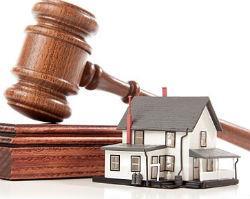 All the most important characteristics apartments are reflected in her BTI passport, as well as in the cadastral passport. These passports must be issued during the entry into ownership. Without them, you cannot make any real estate transactions. When the characteristics of an apartment change, it will automatically invalidate its passports.. Consequently, the owner, with any intention to dispose of real estate, may find himself in a difficult position.
All the most important characteristics apartments are reflected in her BTI passport, as well as in the cadastral passport. These passports must be issued during the entry into ownership. Without them, you cannot make any real estate transactions. When the characteristics of an apartment change, it will automatically invalidate its passports.. Consequently, the owner, with any intention to dispose of real estate, may find himself in a difficult position.
If you leave everything as it is and do not issue new passports, then in the future it will not be possible to simply sell, buy, mortgage, or inherit an apartment just like that. If the buyer even agrees to complete the transaction in this form, he will require a serious discount in order to use this money to carry out the coordination on his own.
In other words, housing loses its liquidity, becomes cheaper and can only be sold at a discount, which is extremely unprofitable for the owner who has invested his money in it. Whereas a properly executed redevelopment dramatically increases the liquidity of an apartment, because apartments with successful alterations are usually in price, in contrast to standard options with a standard set of shortcomings.
Form or...?
Summarizing the above, it is important to note that the obligation to register redevelopment always lies with the owner himself. You can use the living space for as long as you like without suffering from inaccuracies in the documents, but in the future this problem will certainly declare itself, and now it is impossible to say how much it will cost to eliminate it.
If you have any questions regarding the purchase of an apartment with illegal redevelopment, then our duty lawyer is ready to answer them promptly.
When selling an apartment, many citizens face various problems that delay the whole process for a long time, and sometimes make it almost impossible.
Is it possible to sell an apartment with illegal redevelopment? Let's take a closer look at all the nuances of this issue.
Dear readers! Our articles talk about typical ways to resolve legal issues, but each case is unique.
If you want to know how to solve exactly your problem - contact the online consultant form on the right. It's fast and free!
Article 25 Chapter 4 of the Housing Code of the Russian Federation indicates the exact meaning of the wording "Re-planning or re-arrangement of an apartment."
Significant alterations made inside the dwelling, entailing a change in architecture, must be reflected in the technical documentation of the premises.
Minor changes inside the apartment that do not affect the load-bearing walls can be made based on the sketch. IN this case changes can be displayed directly in the BTI plan, what to demolish - in red, what to build - in green.
According to the sketch, you can do the following work:
- Perform additional installation or replacement of equipment, while not affecting the water supply risers and sewers.
- Registration and transfer of doorways, if there is no additional load on the floors.
- Construction of full or partial partitions and walls that are not related to load-bearing structures.
Reorganizations that affect load-bearing structures are somewhat more difficult to make; all changes must be made on the basis of a project that is being considered by an enterprise that has SRO approval. These organizations are responsible for issuing permits.
Project changes that need to be done include:
- Restructuring of the floor structure;
- Installation of stairs in ceilings;
- Changing doorways in load-bearing structures, combining several neighboring apartments;
- Installation of partitions that carry an additional load on the load-bearing walls.
Reorganization and redevelopment of premises have some differences between themselves. Let's talk about this in more detail.
Changes related to the replacement or transfer of sanitary, electrical and other engineering equipment that need to be made to the premises refer to the reorganization of the apartment.
Article 25 of the Housing Code of the Russian Federation defines more precisely the types of work that are classified as reconstruction, and are carried out on the basis of an approved project:
- Remodeling and installation of kitchens, toilets, bathroom.
- Complete replacement of plumbing and engineering equipment.
- Installation of additional equipment that will require additional energy costs, water consumption, additional laying of networks (by the way, laying underfloor heating does not belong to this list).
- The dismantling of engineering networks, but with the preservation of the place of the main risers and sewers, also refers to the reorganization, but these changes can be made based on the sketch.
- Changing plumbing, gas and heating appliances (an exception to the rule is the transfer of heating appliances to balconies).
- Replacing electric stoves with gas stoves and vice versa.
Having defined the concept of reorganization, you see that the changes associated with the transfer of engineering, sanitary, technical equipment are reorganization. If your changes affect walls, load-bearing structures, combining rooms, apartments, etc., you demolish and build new buildings, these changes are called redevelopment.
How to sell an apartment with a non-legal redevelopment?
It is possible and easy to sell an apartment with illegal redevelopment, the cost of the apartment at the same time does not need to be reduced, if the buyer is satisfied with the apartment with redevelopment, then it is possible not to legalize it. Went to reg. chamber and executed a deal with an old passport, ahead of time the validity of the passport was 5 years, now the law does not establish the validity period of the technical passport for an apartment, i.e. you can also register with the old one, on which the redevelopment is not indicated.
Is it possible to sell an apartment with an illegal layout in a mortgage?
It is possible, but not everything is so simple. A technical passport for an apartment will be required by the bank in without fail, and it will also be necessary to carry out, and here it is necessary either to negotiate or legitimize the redevelopment.
An example of how to sell an apartment with a non-legalized redevelopment:
People bought an apartment with a mortgage in a house under construction and immediately after the completion of construction they did a redevelopment, but the apartment does not belong to them, but to the bank by mortgage, the moment has come for the mortgage to be redeemed and the bank asks for a market assessment, and photographs of the appraisal object are taken during the assessment. You can cheat a little, agree with both the technician and the appraiser who will go to the site and show them the apartment on the floor below or above (after agreeing with the neighbors), well, or show nothing at all, as you agree.
Again, if the redevelopment is small, well, you demolished a small black closet, and who knows and how do they find out that you have a redevelopment, BTI used to put “re-planning” stamps on the technical passport, now they don’t put any stamp. Of course, this trick will not work if you have no walls at all.
What redevelopment of an apartment does not require approval?
The redevelopment carried out in the apartment is divided into four categories:
- Agreement is required.
- Does not require project approval.
- Prohibited redevelopments.
- It requires not only the approval of the project, but also the consent of the owners (arrangement of landings, front areas).
Such a division was proposed by the Moscow Housing Inspection, the rest of the regions of the Russian Federation, it was proposed to focus on these groups. Let's consider the first and second groups in more detail.
The first group includes the following types works:
- Reinstallation of radiators;
- Installation of air conditioner;
- Kitchen relocation (expansion);
- Reinstallation of the window with a change in the frame;
- Carrying out works on glazing loggias;
- Carrying out work related to the installation of additional openings, not related to load-bearing structures;
- Dismantling cabinets (wall);
- Changing partitions that are not load-bearing structures and do not separate "wet" areas;
- Installation of sanitary equipment within the existing room.
Note!!! The last point is relevant only to residential premises, in other cases, this type of work requires project approval.
The second group includes the following types of work:
- Dismantling of existing engineering networks that require additional energy costs;
- Dismantling of partitions that are load-bearing;
- Installation of partitions in residential premises with wooden floors;
- Replacement of electric stoves with gas stoves and their transfer to another place;
- Installation of vertical stairs;
- Installation of openings in the walls, which are related to load-bearing structures;
- Dismantling and relocation of toilets and bathrooms.
What redevelopment of an apartment is prohibited by law?
You have decided to redevelop the apartment, before you start doing something, you need to coordinate all the work that you plan to carry out with the project. However, not all types of redevelopment are allowed. Given that you live in an apartment building and some work may cause inconvenience to other residents, you need to look at their interests.
Firstly, your redevelopment should not worsen the operational data of the house. Secondly, the dismantling of load-bearing structures is prohibited, as this can even lead to the collapse of the wall. And the safety of your neighbors is an important factor which must be observed.
If you plan to combine the kitchen with a room, while there is a gas stove in the kitchen, the housing inspection will refuse your request, in order to avoid such misunderstandings, it is enough to install a sliding partition.
If your changes affect the places of common house communications, and after the work has been done, access to them will be limited, you will also be denied redevelopment.
You will also not always be able to swap the room and the kitchen; for this, certain conditions must be met.
It will not be possible to agree on redevelopment if your house is on the list of premises for demolition.
If you still did the redevelopment without approval, you can try to carry out the approval procedure “backdating”. In the process, you will be issued a fine and a decision, either to return the apartment to its original appearance, or to coordinate it in the prescribed form.
Decree of the Government of Moscow No. 508-PP indicates a detailed list of works that are prohibited during the redevelopment of an apartment.
One of the types of undesirable encumbrance of an apartment is illegal redevelopment. In this article, we will consider the risks of both parties - both the seller and the buyer.
According to the Law on state registration rights to real estate and transactions with it, is not included in the list of grounds for refusing to register an agreement, however, in practice, Rosreestr often refuses to make transactions if the apartment has redevelopment and red lines are reflected in the BTI documents.
Sale of an apartment with redevelopment, photo:



How to detect that an apartment is being sold with illegal redevelopment?
It happens that when selling an apartment with redevelopment, unscrupulous realtors hush up this fact. That's why future buyers first of all need to check the current layout of the apartment withfloor plan BTI. If you find discrepancies, then this will mean an unauthorized reorganization of the apartment, not agreed with the supervisory authorities.
In the case of buying an apartment, if the changes are shown on the BTI floor plan with red lines. you, as the new owner, will be obliged to legalize the changes that have taken place in the Moscow Housing Inspectorate, that is, to collect necessary documents and pay a fine . It should be noted that it is not always possible to legitimize the BTI red lines. If the repair was carried out in violation of building codes and regulations, or does not comply with housing legislation , you will have to partially or completely return the apartment previous view. The purchase of such an apartment may in the future turn into significant material losses for you, since restoring the original layout or bringing the layout of the apartment to an agreed option will fall on the shoulders of the future owner.
BTI plan with red lines, photo:

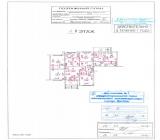
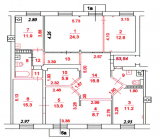
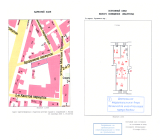
Assessment of redevelopment when selling an apartment
Selling an apartment with redevelopment can turn into a good deal for you only if the work was legalized on time. According to statistics, the cost of an apartment with an agreed redevelopment is at least 10% higher than the cost of similar housing, but without redevelopment. The cost of an apartment with an illegal redevelopment during the sale is at least reduced by the same 10%, or even more.
Our company is often called by future buyers and asked to estimate the cost of redevelopment, as the seller is ready to make a discount on the cost of its approval.
However, there are many pitfalls in such assessments, in connection with which we provide telephone consultations with reservations. For example, the buyer asks: how much does it cost to legalize the combination of a bathroom and a bathroom. In general, this is a simple redevelopment, the cost and terms are quite standard. However, in addition to these changes, buyers often do not convey to us a lot of other information, since they are not specialists in this field and do not even suspect that, for example, replacing linoleum with tiles or moving a doorway also refers to redevelopment, respectively, the cost and terms of approval will increase .
Transfer of the doorway, photo:
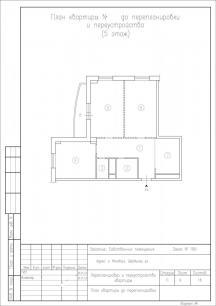
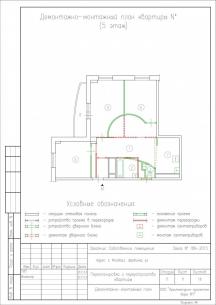

Photos of our work on the transfer of the entrance to the apartment:
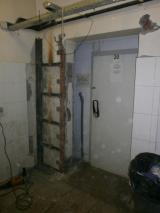

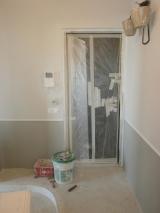

And often there are cases when redevelopment is not agreed upon in principle. For example, if you ask: “is it possible to legalize the combination of a bathroom and a bathroom if the plumbing box is slightly cut in the bathroom”? We will answer: it is allowed to combine premises, and the consent of 2/3 of the owners of apartments in the house is required to affect the plumbing closet.
The problem here is that redevelopments are not agreed in “parts”, and some individual event cannot be agreed upon if another is contrary to the law (“I will cut out the opening, but I will not strengthen it”).
The owner can consult about the possibility of coordinating the redevelopment both with the specialists of the profile company, and in the My Documents center or with the managers housing inspection the corresponding district of Moscow at office hours.
The list of activities prohibited during redevelopment can also be found in clause 11 of Appendix 1 of Decree of the Government of Moscow No. 508 in edition 840.
It says that when redevelopment is prohibited:
The practice of selling an apartment with illegal redevelopment
Consider two common cases:
Option 1 - If an apartment with an illegal layout is bought for cash
In this case, immediately after the transaction, the responsibility passes to the buyer, since the property was registered according to the old BTI plan. As a rule, in this situation, it is found out how much the legalization of redevelopment will cost, and a discount is made on the cost of approval.
The seller here does not risk anything. He sold the apartment according to old documents, in which there is no redevelopment, formally it was already made by the new owner. But the buyer may be in unpleasant situation: unauthorized redevelopment may turn out to be inconsistent and the cost of its elimination will be many times greater than the discount that the seller made. Moreover, in 90% of cases, the assessment of the cost of redevelopment approval is made on the basis of a couple of phone calls to specialized companies, even without an analysis of BTI plans.
Option 2 - If the buyer purchases an apartment with a mortgage.
There are many more complexities here. Many banks initially do not issue mortgage loans, for the purchase of apartments with illegal redevelopment.
But we will consider a situation in which the bank is fundamentally not against the execution of a transaction for the sale of an apartment with an illegal redevelopment.
Salesman again, he wins - his risks are minimal, except that he will have to look for a buyer longer. He sells an apartment with an illegal redevelopment “in the open”, that is, the buyer, bank, insurance and appraisal company know that the apartment has an illegal redevelopment, but they are still ready to provide a loan.
Buyer- there are more complexities. The bank and the insurance company provide a loan only on the condition that after the purchase of the apartment, the redevelopment will be legalized in the prescribed manner. This condition is prescribed in the contract with clear terms. Usually this period is 6 months. The risk that the redevelopment will be inconsistent, falls entirely on the future owner and appraisal company(who also evaluate the possibility of agreement by randomly making 1-2 phone calls). In addition, at the time of registration of the transaction, Rosreestr may refuse on the basis of the fact that redevelopment has been carried out in the apartment.
